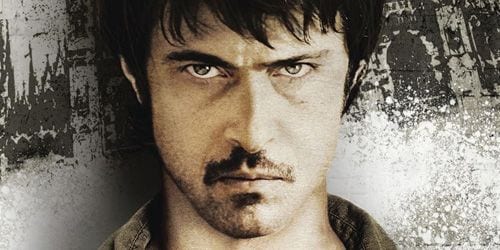
Angel of Evil belongs squarely in the family of new school European crime films, right along side of the likes of A Prophet and the Mesrine films. A gritty, life-long portrait of a career criminal, Angel of Evil has a lot going for it. Based on real life bank robber, kidnapper, and gangster, Renato Vallanzasca (Kim Rossi Stuart, Romanzo Criminale), the plot follows your protagonist from his childhood, through a vaunted criminal career that features more than a couple escapes from prison.
Different from a others of this type, Renato comes from a middle-class background, claiming that he was born to become a thief. The tendencies certainly surface early enough—his first crew, made up of grade school hooligans, free the tiger from the local circus. That crime lands him in a reform school, the first stop in what becomes a lifetime largely spent in penal institutions.
The funky, slick ’70s Italian environment is a great backdrop, one that Rossi Stuart plays to a tee, and it’s his blue-eyed charm that carries much of Angel of Evil. His Renato is cocky and charismatic, drawing people to him like bugs to one of those florescent purple bug zappers. He has nice suits, a sexy hooker girlfriend (Valeria Solarino), and his crew of good-time-guys doubles as a band of outlaws.
They live the life with frenetic energy, stepping up to the big time as they try to blow the lid off of Milan. People want to be around him, even though they’re likely to get burned. But if nothing else in life, Renato is deeply loyal to his cronies, even taking the full heat for an armored car robbery rather than give up any of his co-conspirators, and almost goes to war when Mafioso thugs and corrupt cops threaten his family.
Through his criminal exploits Renato becomes a folk hero, the kind of pop cultural icon who receives endless bags of mail and marriage proposals from strangers even while in prison. This is where Angel of Evil, and Vallanzasca’s story, mimics the modern world. His trials become media events, more about theatrics and posturing than serving justice; journalists vie for interviews that fuel huge ratings; and his face is plastered all over the papers and magazines. Even when incarcerated he is gawked at with a mixture of awe and reverence, by both the criminal world and the general populace.
When Renato is in the joint, which is much of the movie and his life, Angel of Evil has definite echoes of Bronson. He’s a constant agitator, mouthing off to guards—which results in numerous (and severe) beatings—and doing everything he can to be transferred or escape—at one point he swallows a handful of nails so they have to take him to the hospital, where he takes flight.
There are a lot of positive elements in Angel of Evil—acting, an interesting story, and a solid supporting cast that includes Pas Vega (Sex and Lucia), to name a few—but despite this potential upside, the film never fully delivers. Ultimately the story never quite grabs you and burrows into your brain like it should. All of the bells and whistles are here, but you never delve in further than the surface; you follow Renato and company from one adventure to the next, one prison cell to another, through endless escape attempts and schemes.
After a while the events are barely connected, and there is little motivation for Renato’s behavior. If you could ask the film why he does what he does, you get the feeling that it would shrug and say, “that’s just how he is,” and there wouldn’t be any more concrete explanation than that. Overly long, Angel of Evil becomes stale, and by the end, you’re well ready for the film to be over.
The DVD release of Angel of Evil comes with a quartet of deleted and extended—emphasis on extended—scenes. On their own they’re nice enough, but for a movie that already goes on too long, they were cut for good reason, and none of them bring anything to the table that wasn’t already there.
The quick, seven-minute long making-of featurette, however, is interesting chiefly to hear director Michele Placido talk about how he and Rossi Stuart met with Vallanzasca, who is now an old man sitting in prison. After their first meeting Placido decided that he should remove himself from these encounters so he wouldn’t be influenced by Renato’s charisma and charm, and go too easy on him in the film. So he left the actor to dissect the career criminal’s psyche and character.
That’s actually the best part of the extras—sorry to ruin it—and the rest is run of the mill stuff. You know, the actors talk about the film in broad, generic terms, all agreeing that it was great to get to work on such a project as Angel of Evil. That sort of thing.

![Call for Papers: All Things Reconsidered [MUSIC] May-August 2024](https://www.popmatters.com/wp-content/uploads/2024/04/all-things-reconsidered-call-music-may-2024-720x380.jpg)



